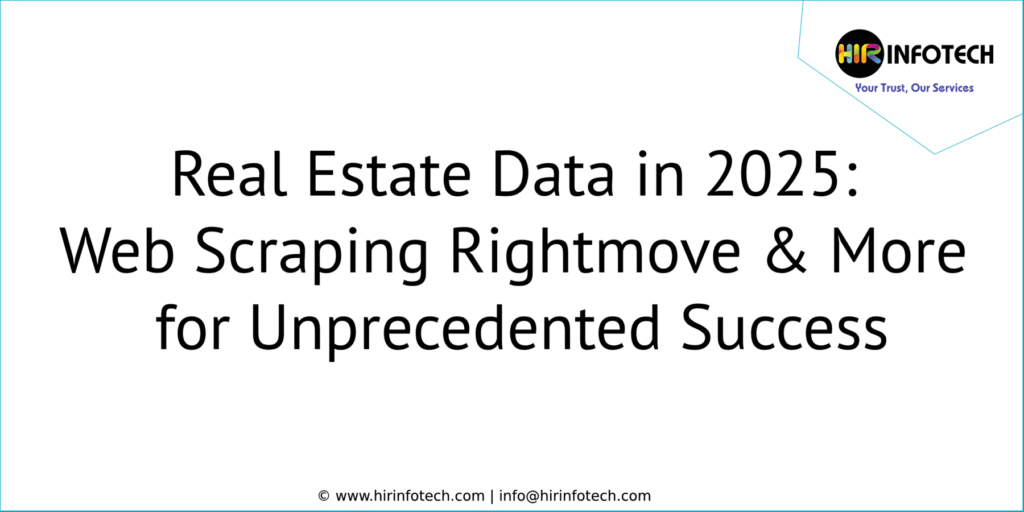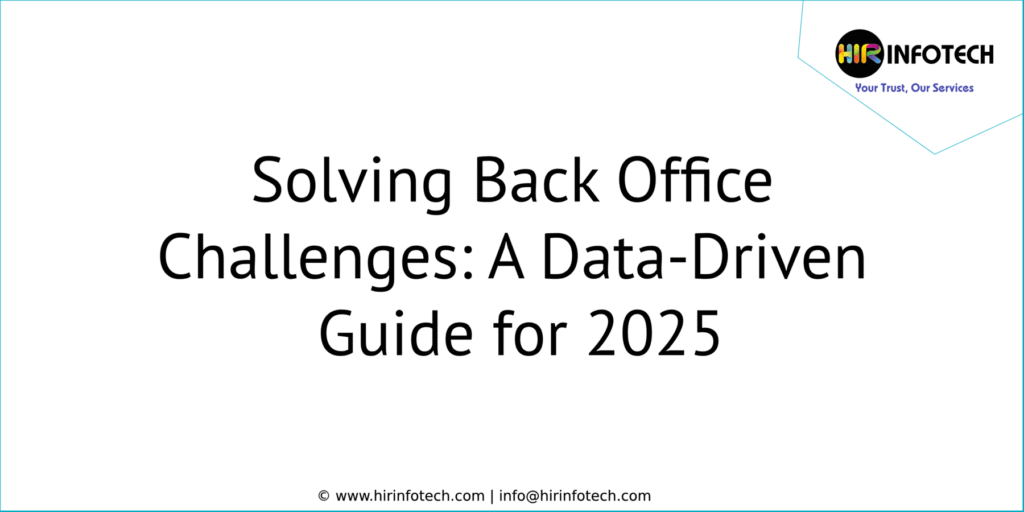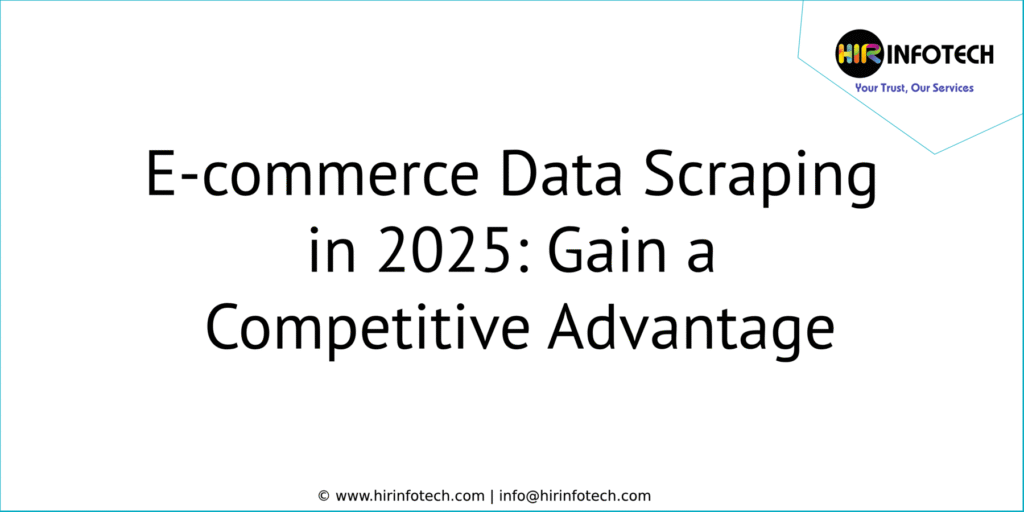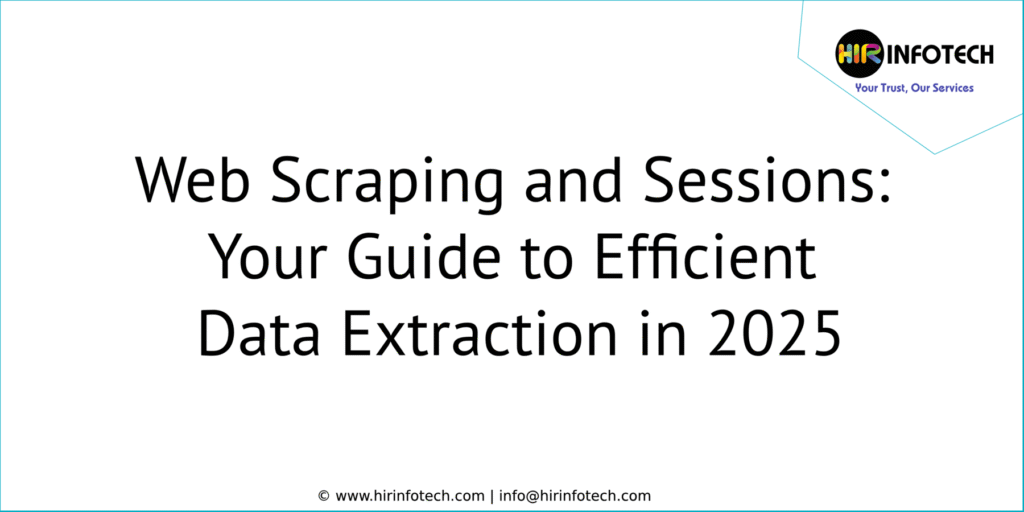
Introduction
In the dynamic and highly competitive real estate market of 2025, data is no longer just an advantage; it’s the foundation of success. Staying ahead of the curve requires immediate access to accurate, comprehensive, and up-to-the-minute property information. Traditional methods of gathering this data are simply too slow, too costly, and too prone to error. Web scraping offers a transformative solution, providing a powerful and efficient way to collect the data that fuels informed decisions. This comprehensive guide dives deep into the world of real estate data scraping, focusing on how scraping platforms like Rightmove, Zoopla, and others can empower your business to thrive in 2025 and beyond.
The Data Challenge in Real Estate: Why Traditional Methods Fail
The real estate industry has always been data-intensive. Agents, investors, developers, and appraisers rely on a constant stream of information to perform their jobs effectively. However, manually collecting property data presents significant challenges:
- Time Consumption: Manually searching multiple websites, compiling spreadsheets, and verifying information is incredibly time-consuming. This takes valuable time away from core business activities like client interaction and deal-making.
- Inaccuracy and Errors: Manual data entry is inherently prone to human error. Typos, misinterpretations, and outdated information can lead to flawed analyses and costly mistakes.
- Limited Scope: It’s virtually impossible for a human team to track every relevant property listing, price change, and market trend across multiple platforms.
- Lack of Real-Time Updates: The real estate market is constantly changing. Manual data collection quickly becomes outdated, leaving you with a stale and potentially misleading picture of the market.
- High Costs: The labor costs associated with manual data collection are substantial, especially when considering the volume of data required for comprehensive analysis.
These limitations make it clear that real estate professionals need a more efficient and reliable way to access the data they need.
Web Scraping: A Game-Changer for the Real Estate Industry
Web scraping is a technology that automates the process of extracting data from websites. Think of it as having a highly skilled, tireless digital assistant that works 24/7, gathering information from across the web and delivering it to you in a structured, usable format. This technology fundamentally changes the way real estate professionals operate, offering:
- Unprecedented Speed: Web scrapers can collect vast amounts of data in a fraction of the time it would take a human team.
- Superior Accuracy: Automated data extraction eliminates the risk of human error, ensuring data integrity.
- Comprehensive Coverage: Scrape data from multiple sources simultaneously, providing a holistic view of the market.
- Real-Time Insights: Access up-to-the-minute information on property listings, price changes, and market trends.
- Cost-Effectiveness: Reduce labor costs and improve overall efficiency, leading to a significant return on investment.
What Real Estate Data Can You Scrape? A Comprehensive List
The possibilities of web scraping in real estate are vast. Here’s a detailed breakdown of the types of data you can extract:
- Basic Property Information:
- Property Type (house, apartment, flat, bungalow, land, commercial property, etc.)
- Number of Bedrooms and Bathrooms
- Square Footage (or Square Meters)
- Year Built
- Property Features (garage, garden, balcony, pool, etc.)
- Location Details:
- Full Address (including street number, street name, city, state/region, postcode/zip code)
- Geographic Coordinates (latitude and longitude) for precise mapping
- Neighborhood Information
- Proximity to Amenities (schools, transportation, shopping centers, etc.)
- Pricing Data:
- Current Listing Price
- Price History (previous listing prices, price reductions, price increases)
- Estimated Value (from online valuation tools)
- Rental Yield (for investment properties)
- Auction Information (if applicable)
- Agent/Seller Information:
- Listing Agent’s Name and Contact Details
- Real Estate Agency Name and Contact Information
- Seller’s Contact Information (where publicly available and legally permissible)
- Property Description:
- Full Text Description of the Property
- Keywords and Phrases used in the Description (for sentiment analysis)
- Information about Amenities and Features
- Details about the Local Area
- Visuals:
- Property Photographs (interior and exterior)
- Virtual Tours (links or embedded videos)
- Floor Plans (images or interactive versions)
- Additional Data Points:
- Listing Status (for sale, sold, under offer, withdrawn, etc.)
- Listing Date (when the property was first listed)
- Time on Market (how long the property has been listed)
- Open House Information
- Property Tax Information (where publicly available)
- School District Information
- Local Crime Statistics (from external sources, linked via location data)
Target Websites: Rightmove, Zoopla, and Beyond (UK Focus – Expand as Needed)
Hir Infotech specializes in scraping data from leading real estate platforms, providing comprehensive coverage of your target market. For the UK market, this includes:
- Rightmove (rightmove.co.uk): The UK’s largest property portal, with a vast database of listings for sale and rent. Rightmove provides detailed property information, agent details, and market trends data.
- Zoopla (zoopla.co.uk): Another major player in the UK real estate market, Zoopla offers similar data to Rightmove, often with additional features like estimated property values and local area guides.
- OnTheMarket (onthemarket.com): A property portal that focuses on presenting properties from leading estate agents, often featuring listings before they appear on other platforms.
- PrimeLocation (primelocation.com): Focuses on higher-end properties.
- Nethouseprices (nethouseprices.com): offers a lot of sold data.
(Expand this section with relevant websites for other target markets, e.g., Zillow, Realtor.com, Trulia for the US; Domain, Realestate.com.au for Australia; etc.) Include brief descriptions of each website and the type of data they offer.
Data Delivery Options: Tailored to Your Needs
Hir Infotech understands that different businesses have different data needs. We offer a range of flexible data delivery formats to ensure seamless integration with your existing systems and workflows:
- Excel Spreadsheets (XLS, XLSX): A familiar and user-friendly format for data analysis and reporting. Ideal for smaller datasets and quick analysis.
- CSV Files (Comma-Separated Values): A simple and widely compatible text-based format suitable for importing data into various applications, including databases and data analysis tools.
- Databases: Direct integration with your existing database systems (e.g., MySQL, PostgreSQL, SQL Server, MongoDB). This eliminates manual data import and ensures data consistency.
- APIs (Application Programming Interfaces): Real-time data feeds that provide a constant stream of updated information directly to your applications. APIs are ideal for dynamic dashboards, automated reporting, and integration with other business systems. This is the most advanced and flexible option.
- JSON: is a lightweight format for transmitting data.
- XML: is another markup language, but it is more verbose.
Benefits of Real Estate Data Scraping: A Competitive Advantage
The advantages of using web scraping for real estate data are numerous and impactful:
- Save Time and Resources: Automate the tedious process of manual data collection, freeing up your team to focus on higher-value tasks like client relationship management and negotiations.
- Gain a Competitive Edge: Access real-time market insights that your competitors may be missing, allowing you to react quickly to changing market conditions.
- Make Data-Driven Decisions: Base your investment strategies, pricing decisions, and marketing efforts on solid, comprehensive data, rather than intuition or guesswork.
- Boost Efficiency and Productivity: Streamline your workflows by automating data acquisition and integration, eliminating manual data entry and reducing errors.
- Scale Your Operations: Easily collect data from multiple sources and scale your data collection efforts as your business grows.
- Improve Accuracy: Eliminate human error and ensure the integrity of your data.
- Unlock Hidden Opportunities: Discover undervalued properties, emerging markets, and profitable investment strategies that might otherwise go unnoticed.
How Real Estate Professionals Use Scraping: Practical Applications
The applications of web scraping in real estate are diverse and powerful:
- Market Analysis and Research:
- Identify current market trends, including price fluctuations, inventory levels, and demand patterns.
- Understand pricing dynamics in specific neighborhoods or property types.
- Discover emerging markets and areas with high growth potential.
- Analyze demographic data and buyer preferences.
- Track the performance of specific property types (e.g., condos, single-family homes).
- Competitive Intelligence:
- Monitor competitor listings, including pricing, property features, and marketing strategies.
- Track the performance of competing real estate agencies.
- Identify new entrants to the market.
- Analyze competitor pricing strategies to inform your own pricing decisions.
- Property Valuation and Appraisal:
- Gather data on comparable properties (comps) to accurately estimate property values.
- Automate the process of finding and analyzing comps, saving time and improving accuracy.
- Create more reliable and data-driven property appraisals.
- Lead Generation:
- Identify potential buyers and sellers by tracking new listings and market activity.
- Find contact information for property owners (where legally permissible).
- Target marketing campaigns to specific demographics and property types.
- Investment Strategy Development:
- Identify undervalued properties and profitable investment opportunities.
- Analyze rental yields and cash flow potential.
- Assess the risk and return of different investment strategies.
- Develop data-backed investment plans.
- Risk Assessments:
- Analyze and prepare for the risk in investment.
Ethical and Legal Scraping Practices: Our Commitment
Hir Infotech is deeply committed to ethical and legal data collection practices. We adhere to the highest standards of data privacy and compliance:
- Respect Website Terms of Service: We carefully review and comply with the terms of service of each website we scrape.
- Robots.txt Adherence: We respect the instructions in robots.txt files, which specify which parts of a website should not be accessed by automated bots.
- Data Privacy Compliance: We are fully compliant with all relevant data privacy regulations, including the General Data Protection Regulation (GDPR) in Europe, the California Consumer Privacy Act (CCPA) in the United1 States, and other applicable laws.
- Responsible Data Handling: We handle all collected data with the utmost care and security, protecting it from unauthorized access and misuse.
- Transparency: We are transparent about our data collection practices and are happy to answer any questions you may have.
- Rate Limiting and Polite Scraping: We implement measures to avoid overloading websites with requests, ensuring that our scraping activities do not disrupt their normal operations.
For more information on ethical web scraping and data privacy, consider these resources:
- The General Data Protection Regulation (GDPR): https://gdpr-info.eu/
- The California Consumer Privacy Act (CCPA): https://oag.ca.gov/privacy/ccpa
Web Scraping API: Real-Time Data for Dynamic Applications
For businesses that require real-time data and seamless integration, a Web Scraping API (Application Programming Interface) is the ideal solution. An API allows your applications to directly request and receive data from our scraping engine, without the need for manual data downloads or file transfers. This enables:
- Real-Time Updates: Access the most up-to-date information on property listings, price changes, and market trends.
- Automated Workflows: Integrate scraped data directly into your CRM, marketing automation platform, or other business systems.
- Dynamic Dashboards: Create interactive dashboards that display real-time market data and insights.
- Custom Applications: Build custom applications that leverage real estate data to meet your specific needs.
Future of Real Estate Data: AI and Machine Learning
The future of real estate data is intertwined with advancements in Artificial Intelligence (AI) and Machine Learning (ML). These technologies are transforming web scraping and data analysis in several ways:
- Enhanced Data Extraction: AI-powered scrapers can more accurately identify and extract data from complex website structures, even with variations in layout and formatting.
- Improved Data Quality: Machine learning algorithms can be used to clean, validate, and standardize scraped data, ensuring higher accuracy and consistency.
- Automated Data Analysis: AI can automatically identify patterns, trends, and anomalies in real estate data, providing valuable insights without manual analysis.
- Predictive Analytics: Machine learning models can be trained on historical data to predict future market trends, property values, and investment opportunities.
- Personalized Recommendations: AI can be used to provide personalized recommendations to buyers, sellers, and investors based on their specific needs and preferences.
Cost of Real Estate Data Scraping: A Customized Approach
The cost of real estate data scraping varies depending on several factors, including:
- The Complexity of the Project: Scraping data from simple websites is less expensive than scraping from complex, dynamic websites.
- The Volume of Data Required: The more data you need, the higher the cost.
- The Frequency of Data Updates: Real-time data updates require more resources and are therefore more expensive than less frequent updates.
- The Specific Data Points Required: Extracting specific, niche data points may require more specialized scraping techniques.
- The Chosen Service Provider: Pricing models vary between different providers.
Hir Infotech offers customized pricing plans to meet the unique needs of each client. Contact us for a personalized quote based on your specific requirements.
Frequently Asked Questions (FAQs)
1. Is property data scraping legal?
Scraping publicly available data is generally legal. However, it’s crucial to respect website terms of service, robots.txt files, and all applicable data privacy regulations (GDPR, CCPA, etc.). Always prioritize ethical and responsible data collection.
2. How often can I scrape data?
We offer a range of data update frequencies, including daily, weekly, monthly, or even real-time updates via our API. The optimal frequency depends on your specific needs and the volatility of the data you’re tracking.
3. What data formats are available?
We provide data in a variety of formats, including Excel spreadsheets (XLS, XLSX), CSV files, direct database integration (MySQL, PostgreSQL, SQL Server, MongoDB), and real-time API feeds (JSON, XML).
4. Can you scrape data from other real estate websites besides Rightmove, Zoopla, and OnTheMarket?
Yes, absolutely. We have experience scraping data from a wide range of real estate websites globally. We can customize our services to target any specific website you need, as long as it’s legally and ethically permissible.
5. How much does real estate data scraping cost?
The cost depends on the factors outlined above (complexity, volume, frequency, data points). Contact us for a personalized quote tailored to your specific project.
6. How do I get started with real estate data scraping?
The first step is to contact us and discuss your requirements. We’ll work with you to understand your needs, identify the best data sources, and develop a customized scraping solution.
7. What happens if a website I’m scraping changes its structure?
Website structures can and do change. Our team constantly monitors the websites we scrape and adapts our scrapers to maintain data accuracy and consistency. We have robust processes in place to handle website changes and minimize any disruption to your data feeds.
8. What is the difference between data extraction and web scraping?
Data extraction involves getting data. Web scraping is one of the methods to extract the data.
Don’t let outdated data collection methods hold you back. Ready to leverage the power of real-time, accurate real estate data to gain a competitive advantage? Contact Hir Infotech today for your web scraping and data solution needs! Our expert team will work with you to develop a customized solution that helps you achieve your business goals. Let us help you transform data into actionable insights and unlock unprecedented success in the dynamic real estate market.



